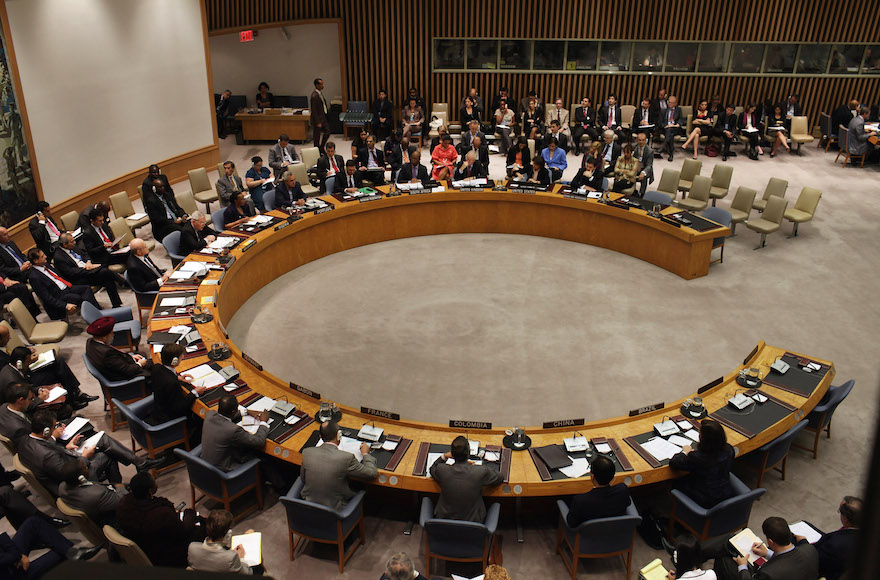(JTA) — U.S. Jewish groups and lawmakers called on the United States to veto a United Nations Security Council resolution they call “one-sided” for blaming Israeli settlements for the lack of progress in peace negotiations.
Israeli Prime Minister Benjamin Netanyahu and President-elect Donald Trump also issued statements Thursday calling for a U.S. veto on a resolution introduced by Egypt the previous day.
Meanwhile, Egypt asked for a postponement of Thursday’s scheduled vote on the resolution against Israeli settlements in the West Bank and eastern Jerusalem. The Israeli media reported that Netanyahu has been in constant contact with its president, Abdel Fattah al-Sisi, which may have led to the request.
A statement by U.S. Secretary of State John Kerry scheduled to come hours before the vote also reportedly was postponed.
Netanyahu in his statement said: “Israelis deeply appreciate one of the great pillars of the U.S.-Israel alliance: the willingness over many years of the U.S. to stand up to the U.N. and veto anti-Israel resolutions. I hope the U.S. won’t abandon this policy.”
The statement reiterated President Barack Obama’s 2011 statement to the United Nations in which he said that peace will not come through U.N. resolutions but through direct negotiations between Israel and the Palestinians.
The United States has traditionally vetoed such resolutions, saying the two sides have to work things out, but it is unclear what Obama will do in the waning days of his administration.
Trump said the resolution “puts Israel in a very poor negotiating position and is extremely unfair to all Israelis.”
The Anti-Defamation League and the Conference of Presidents of Major American Jewish Organizations both called for a veto.
“We expect the United States to veto this biased, unconstructive, resolution in the U.N. Security Council and affirm U.S. support for a two-state solution that will bilaterally resolve all outstanding issues — including settlements,” the ADL’s CEO, Jonathan Greenblatt, said in a statement issued Thursday.
“We are cognizant that recent Israeli statements and legislative action regarding settlements have raised concerns among the international community. And while U.S. policy consistently has seen the expansion of settlements as an obstacle to a long-term peace, it has also recognized that there are other highly significant issues at play and that a solution to the conflict cannot be imposed on the parties but must be achieved by the parties themselves. However, this resolution is not a productive way to impact such policies,” the statement said.
Greenblatt added that the Palestinians should be held responsible for “ongoing incitement and unwillingness to engage in bilateral negotiations.”
Presidents Conference leaders called on the United States to “unequivocally affirm” that it would veto any one-sided condemnatory resolution.
Its chairman and executive vice chairman, Stephen Greenberg and Malcolm Hoenlein, said in a statement that the proposed resolution is among UN measures that “represent the latest misguided effort to enlist the Security Council to provide an escape route for the Palestinians to evade their obligations to negotiate directly with Israel to reach a final agreement ending the conflict. We have seen this kind of evasive maneuver by the Palestinians before.”
“Today, on the eve of a new U.S. administration, is not the time to alter the course of a sound and consistent U.S. policy at the U.N. Security Council. It is a time to reiterate and emphasize the approach that has preserved the possibility for the parties themselves to directly tackle the issues that will lead to a comprehensive agreement ending the conflict. We would add that allowing the proposed resolutions to be adopted will also unduly restrict the incoming administration’s ability to pursue policies to advance peace and encourage the parties to deal directly with each other.”
AIPAC also called for a veto, saying that the United Nations “is not the proper venue to resolve this conflict.” It statement continued: “Palestinian leadership has refused to return to talks with Israel and has continued to incite violence. A UNSC resolution would only reward this negative strategy and undermine efforts to truly pursue a lasting peace.”
Two Jewish lawmakers, Reps. Ted Deutch, D-Fla., and Nita Lowey, D-N.Y., also called for a veto.
“As 393 of my colleagues and I stated unambiguously in a letter to President Obama in April, the U.N. Security Council is not the venue for advancing conditions for peace,” said Deutch, the ranking member of the House Foreign Affairs subcommittee on the Middle East and North Africa. “Achieving a lasting and permanent solution with two states for two peoples will only come through direct, bilateral negotiations between the parties.”
Lowey, D-N.Y., the ranking Democrat on the Appropriations Committee and the state and foreign operations subcommittee, said a veto would “uphold longstanding U.S. policy of defending Israel against one-sided resolutions.”
“The Israeli-Palestinian conflict should not be internationalized,” she said. “Only the parties themselves can resolve their complicated differences through direct negotiations. The proposed resolution will not further the cause of peace.”
As Thursday wore on, more lawmakers lined up to issue statements calling for a veto of any such resolutions, including Texas Republican Sen. Ted Cruz.

Help ensure Jewish news remains accessible to all. Your donation to the Jewish Telegraphic Agency powers the trusted journalism that has connected Jewish communities worldwide for more than 100 years. With your help, JTA can continue to deliver vital news and insights. Donate today.






